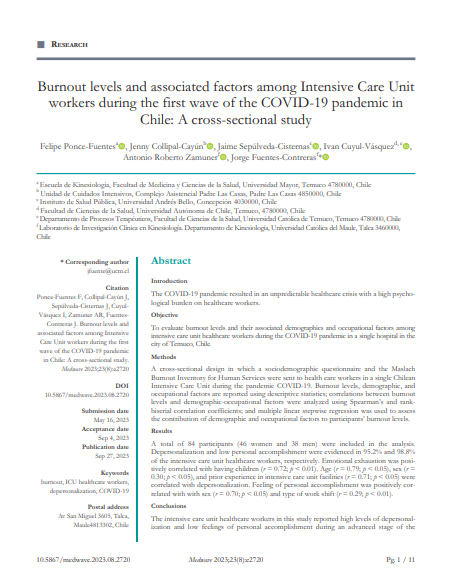Burnout levels and associated factors among Intensive Care Unit workers during the first wave of the COVID-19 pandemic in Chile: A cross-sectional study

Fecha
2023-09-27Autor
Ponce-Fuentes, Felipe [Escuela de Kinesiología, Facultad de Medicina y Ciencias de la Salud, Universidad Mayor, Temuco, Chile]
Collipal-Cayún, Jenny
Sepúlveda-Cisternas, Jaime
Cuyul-Vásquez, Iván
Roberto Zamuner, Antonio
Fuentes-Contreras, Jorge
Ubicación geográfica
Notas
HERRAMIENTAS
Acceda a títulos restringidos
¿Cómo descargar?Resumen
Introduction: The COVID-19 pandemic resulted in an unpredictable healthcare crisis with a high psychological burden on healthcare workers. Objective: To evaluate burnout levels and their associated demographics and occupational factors among intensive care unit healthcare workers during the COVID-19 pandemic in a single hospital in the city of Temuco, Chile. Methods: A cross-sectional design in which a sociodemographic questionnaire and the Maslach Burnout Inventory for Human Services were sent to health care workers in a single Chilean Intensive Care Unit during the pandemic COVID-19. Burnout levels, demographic, and occupational factors are reported using descriptive statistics; correlations between burnout levels and demographic-occupational factors were analyzed using Spearman's and rank-biserial correlation coefficients; and multiple linear stepwise regression was used to assess the contribution of demographic and occupational factors to participants' burnout levels. Results: A total of 84 participants (46 women and 38 men) were included in the analysis. Depersonalization and low personal accomplishment were evidenced in 95.2% and 98.8% of the intensive care unit healthcare workers, respectively. Emotional exhaustion was positively correlated with having children ( = 0.72; < 0.01). Age ( = 0.79; < 0.05), sex ( = 0.30; < 0.05), and prior experience in intensive care unit facilities ( = 0.71; < 0.05) were correlated with depersonalization. Feeling of personal accomplishment was positively correlated with with sex ( = 0.70; < 0.05) and type of work shift ( = 0.29; < 0.01). Conclusions: The intensive care unit healthcare workers in this study reported high levels of depersonalization and low feelings of personal accomplishment during an advanced stage of the COVID-19 pandemic. Older age, being female, having children, having intensive care unit experience, and working at 4th shift were factors related to burnout dimensions.
URI
https://repositorio.umayor.cl/xmlui/handle/sibum/9460https://doi.org/10.5867/medwave.2023.08.2720
https://www.medwave.cl/medios/investigacion/estudios/2720/medwave_2023_2720.pdf
Coleccion/es a la/s que pertenece:
Si usted es autor(a) de este documento y NO desea que su publicación tenga acceso público en este repositorio, por favor complete el formulario aquí.